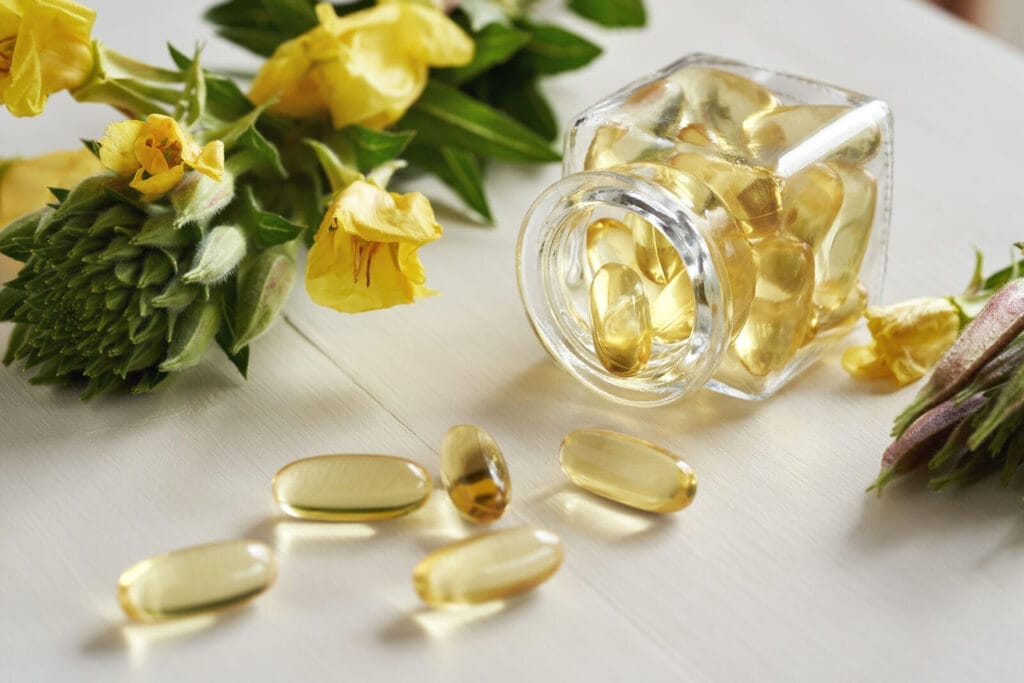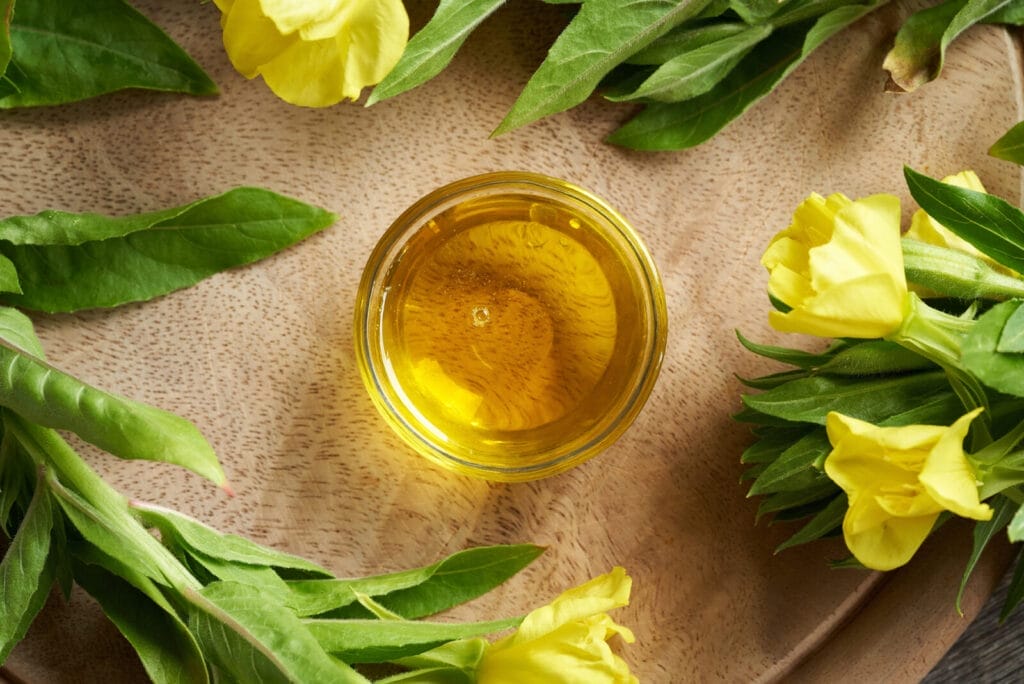Harnessing the power of Evening Primrose Oil
Health enthusiasts are increasingly turning to natural supplements to address various health concerns, and one supplement that has garnered attention for its plethora of potential benefits is evening primrose oil. Extracted from the seeds of the evening primrose plant, this oil is rich in omega-6 fatty acids known for their anti-inflammatory properties. In this article, we delve into the various potential health benefits of evening primrose oil and why it might be a valuable addition to your health regimen.
What is Evening Primrose Oil?
Evening primrose oil (EPO) is a natural oil extracted from the evening primrose plant, scientifically known as Oenothera biennis. This plant is native to North America but has also been cultivated in Europe and other parts of the world. It produces yellow flowers that bloom in the evening, hence its name and these flowers give way to small seed pods; the seeds contained within these pods are the source of evening primrose oil. EPO is renowned for its high content of linoleic acid (LA) and gamma-linolenic acid (GLA), omega-6 fatty acids that play crucial roles in maintaining various bodily functions and promoting overall health[1].

How can Evening Primrose Oil support health?
From treating eczema to relieving hot flashes, the power of evening primrose oil and its unique fatty acid profile has been researched across a multitude of health concerns. Some of the areas that its use has been explored include:
Skin health – One of the most well-documented uses of EPO is for improving skin health. EPO may help manage conditions like eczema and dermatitis by reducing inflammation and promoting skin hydration. The gamma-linolenic acid in EPO helps maintain the skin’s moisture barrier, potentially easing the dry, itchy skin associated with these conditions[2]. Some studies suggest that EPO may help alleviate acne symptoms by reducing skin inflammation and balancing oil production[3]. To learn more about natural ways to relieve eczema symptoms, click here.
Hormonal balance – EPO is often recommended for women experiencing hormonal fluctuations. It may be particularly beneficial for alleviating symptoms of premenstrual syndrome (PMS) such as breast tenderness, mood swings, and bloating[4]. Additionally, menopausal women may, along with incorporating other holistic measures, find relief from hot flashes and night sweats by incorporating EPO into their diet[5]. It has been suggested that these effects can be attributed to the phytoestrogens in EPO, which mimic the effect of natural oestrogen, to help rebalance hormones and reduce associated symptoms.
Rheumatoid arthritis – Both linoleic acid and gamma-linolenic acid have been shown to have anti-inflammatory properties in the human body[6]. As such, rheumatoid arthritis sufferers may benefit from the anti-inflammatory effects of EPO. The GLA in EPO may help reduce joint pain and stiffness, improving overall joint function[7]. Several studies have shown that EPO supplements may lead to a significant reduction in the symptoms of rheumatoid arthritis[8], making it a popular natural remedy for this condition.
Anti-inflammatory effects – Chronic inflammation is one of the leading causes of premature ageing and modern-day ailments and diseases and as such, anti-inflammatory supplements can be a useful lifestyle addition for health promotion and disease prevention[9]. Studies have shown that EPO supplementation may be helpful in supporting a number of inflammation-related diseases including diabetes, heart disease and autoimmune disorders[10].
While many of these benefits are supported by anecdotal evidence and preliminary studies, it is important to note that more extensive, rigorous and longer-term clinical trials are often needed to fully confirm these effects. That being said, EPO is generally considered safe for most people, so may prove a viable option for those seeking a natural alternative to traditional treatments. Some individuals may experience mild side effects such as gastrointestinal upset, headaches, or allergic reactions; as such, it would be wise to begin at a lower dose and monitor effects before increasing the dosage. Pregnant or breastfeeding women should consult their healthcare provider before using EPO. Additionally, individuals with epilepsy or bleeding disorders should use EPO with caution, as it may increase the risk of seizures or bleeding[11].

Summary
For general health maintenance, a common dose is 500-1000 mg of evening primrose oil per day, standardized to contain 8-10% gamma-linolenic acid. Our Evening Primrose Oil Softgels contain 1000mg of evening primrose oil, providing 80mg, or 8%, gamma-linolenic acid. For specific conditions like eczema or rheumatoid arthritis, higher doses may be recommended. For example, 2000mg of evening primrose oil daily proved to be effective in relieving night sweats in menopausal women [5]. To ensure the highest quality, EPO should be stored in a cool, dark place. Exposure to light, air, and heat can cause the oil to oxidize and lose its beneficial properties.
To conclude, EPO is rich in linoleic acid (LA) and gamma-linolenic acid (GLA), omega-6 fatty acids that play crucial roles in maintaining various bodily functions and promoting overall health. It is this unique combination of fatty acids, along with its phytoestrogen content, that may be helpful in supporting conditions such as eczema, acne, menopause and rheumatoid arthritis, as well as proving a useful supplement for general health maintenance. While generally safe, pregnant or breastfeeding individuals and those with underlying health issues should consult a healthcare provider before use.
References
[1] Farag, M.A. et al. (2023) ‘Evening primrose oil: A comprehensive review of its bioactives, extraction, analysis, oil quality, therapeutic merits, and safety’, Food & Function, 14(18), pp. 8049–8070. doi:10.1039/d3fo01949g.
[2] Anheyer, M. et al. (2024) ‘Herbal medicine in children and adults with atopic dermatitis: A systematic review and meta-analysis’, Dermatitis® [Preprint]. doi:10.1089/derm.2024.0132.
[3] Kaźmierska, A. et al. (2022) ‘Effect of evening primrose oil supplementation on biochemical parameters and nutrition of patients treated with isotretinoin for acne vulgaris: A randomized double-blind trial’, Nutrients, 14(7), p. 1342. doi:10.3390/nu14071342.
[4] Mahboubi, M. (2019) ‘Evening primrose (oenothera biennis) oil in management of female ailments’, Journal of Menopausal Medicine, 25(2), p. 74. doi:10.6118/jmm.18190.
[5] Kazemi, F. et al. (2021) ‘The effect of evening primrose oil capsule on hot flashes and night sweats in Postmenopausal women: A single-blind randomized controlled trial’, Journal of Menopausal Medicine, 27(1), p. 8. doi:10.6118/jmm.20033.
[6] Timoszuk, M., Bielawska, K. and Skrzydlewska, E. (2018) ‘Evening Primrose (Oenothera biennis) biological activity dependent on chemical composition’, Antioxidants, 7(8), p. 108. doi:10.3390/antiox7080108.
[7] Veselinovic, M. et al. (2017) ‘Clinical benefits of N-3 PUFA and ɤ-linolenic acid in patients with rheumatoid arthritis’, Nutrients, 9(4), p. 325. doi:10.3390/nu9040325.
[8] Hajiaghayi, M. et al. (2024) ‘The Efficacy of Evening Primrose in Rheumatoid Arthritis: a Systematic Review’, Research Journal of Pharmacognosy, 11(2), pp. 71–79. doi:10.22127/RJP.2023.414090.2212.
[9] Sharifi, M. et al. (2024) ‘The effect of Oenothera biennis (evening primrose) oil on inflammatory diseases: A systematic review of Clinical Trials’, BMC Complementary Medicine and Therapies, 24(1). doi:10.1186/s12906-024-04378-5.
[10] Majdinasab, N. et al. (2018) ‘The effect of evening primrose oil on fatigue and quality of life in patients with multiple sclerosis’, Neuropsychiatric Disease and Treatment, Volume 14, pp. 1505–1512. doi:10.2147/ndt.s149403.
[11] Lippert, A. and Renner, B. (2022) ‘Herb–drug interaction in inflammatory diseases: Review of phytomedicine and Herbal Supplements’, Journal of Clinical Medicine, 11(6), p. 1567. doi:10.3390/jcm11061567.







